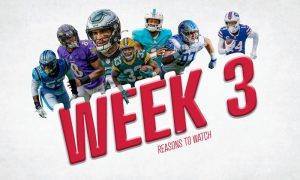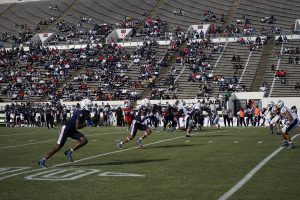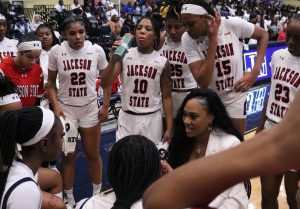 Christopher Rash
Christopher Rash
MC301/Staff Writer
Success on and off the field is the goal of all student athletes. However, college for many athletes can be a difficult task with the added challenges of maintaining the balance between athletics and academics.
“The higher I go in my education, the more challenging it becomes to remain balanced with staying on top of my grades as well as my craft,” said Ky’Bria Spell, a senior industrial technology major from Atlanta, Ga.
Spell, a member of the Jackson State University Track team, stated that being a student athlete is not an easy task but it has caused her to become more disciplined.
“I focus more on my school work due to my schedule being so jam-packed,” said Spell.
In a US News and World Report article, these “8 Tips for the Student Athlete” were given on balancing academics and athletics.
1. Your job is to be a student athlete:
Practice sound time management. Treat your responsibilities as if they were your-full time job, because they are. Create an hourly planner, and update it daily.
2. Telegraph your absences: The key to successfully managing missed classes is to communicate.
3. Avoid “imposter syndrome”: Make an effort to cultivate friends outside your small circle of teammates and coaches.
4. Be on time and be prepared: If you are perceived as responsible and reliable from the start, when you are late or you do make a mistake (and you will), you will have created a margin for error.
5. Manage your brand: You are the face of your university, and your actions reflect on your institution and your sport, both positively and negatively.
6. Make the most of failure: Resist the temptation to give up. Make a realistic assessment of where you went wrong and improve.
7. Value Plan B: Fewer than 5 percent of all college athletes compete professionally after graduation. This means that you need to make a Plan B for what happens if your athletic career ends after college-level competition.
8. Plan for life: It’s easy to forget the big picture when your daily life is packed with academics and athletics, but remember to use your resources and build your network.
Vincent Sampson believes practicing good time management is the first principle essential in the success of student athletes.
“Being aware of the time I have to accomplish the things I have to do really helps me to be successful,” said Vincent Sampson, a freshmen civil engineer major from Alexandria, La. “Being an athlete helps me to stay on top of my academics because in order to play, I must be on top of my game both on and off the field.”
Sampson, a football player at JSU also stated that he does not have much time for anything other than his books and the game of football but that’s fine with him because this is what it takes in order to be great.
Deandre Wansley agrees with Simpson.
“It is a must to stay on top of your grades. It’s a requirement that must be met to be eligible to play the game,” said Wansley, a junior civil engineering major from Decatur, Miss.
Wansley stated that he takes full advantage of the mandatory study hall hours that are a requirement for all football players.
“If you love the game, you will do what is required to be able to suit up on game day,” said Wansley.
Some athletes, like Xavier Harris, believe that it is up to the student to take advantage of the resources available to help with academic obligations.
“Being an athlete could hinder or help your education but for me it helps,” said Harris, a sophomore criminal justice major from Monroe, La.
Harris, a football player at JSU, also stated that many things that have been put in place to athletes succeed, including study hall, tutors, and advisors.
“Even though all these things have been put in place, the responsibility at the end of each day is on me,” said Harris.





Be First to Comment